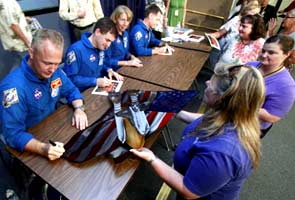Washington: The United States does not have enough astronauts to meet the changing needs of human spaceflight in the coming years, warned a report Wednesday by a non-profit group that advises on science policy.
The shrinking American astronaut corps poses risks to the US investment in human spaceflight and NASA should take steps to boost the size of its space-flying crew, the National Research Council said in its report.
"Viewed as a supply chain, astronaut selection and training is very sensitive to critical shortfalls," said committee co-chair Frederick Gregory, former commander of three shuttle missions.
"Astronauts who are trained for specific roles and missions can't be easily interchanged," said Gregory, also a former NASA deputy administrator.
At its peak in 1999, during the space shuttle era and as the International Space Station was being built, NASA maintained a staff of 150 astronauts.
But in 2011 that number shrank to 61, as the space shuttle program ended after 30 years leaving Russia as the only nation with a vehicle capable of taking people to the ISS.
NASA has set a minimum requirement of 55 to 60 active US astronauts through 2016, by which time private industry hopes to have tested a new US space capsule that will be able to once again bring humans to low-Earth orbit.
Plans for a deep-space mission to take astronauts to Mars or an asteroid are in view for 2025 and beyond.
Those missions require more training, longer stays in space, greater exposure to radiation, and a higher risk of medical problems or burnout that may cause astronauts to retire early or be unable to fly on future missions.
Even though fewer astronauts will be flying per year than they did during the space shuttle era -- down to an average of six from a peak of 28 -- the United States needs a larger corps to draw from, said the council.
"The committee concluded that the currently projected minimum staffing target size for the active astronaut corps poses a risk to the US investment in human spaceflight capabilities," said the report.
"Given the range of potential crew assignment constraints and uncertainty in future requirements, the astronaut corps appears to be sized below the minimum required," it added.
"The current plan for the size of the astronaut corps does not have the flexibility to accommodate commercial, exploration, and new mission development tasks, or unexpected increases in attrition."
The report pointed to other "sources of uncertainty" that could be risky if the US astronauts corps is too small, such as medical conditions that arise following long stints in space.
"For example, a relatively new medical condition has been observed among astronauts returning from long-duration space missions -- papilledema, a swelling of the optic disk," it said.
"This condition has led to several members of the astronaut corps being medically disqualified from flying again until the condition improves."
Other medical conditions that particularly affect astronauts include bone loss and radiation exposure, meaning "not all astronauts returning from long-duration missions will re-qualify for ISS missions." Longer flights could also lead astronauts to retire early for personal reasons.
"After their first long-duration ISS mission, members of the astronaut corps might choose to leave the corps rather than fly another long-duration mission with its attendant stresses on family and home life."
The ISS, which is to stay in operation until 2020, is typically staffed by three Russians, two Americans and one Japanese on rotating six-month assignments.
But the future of the orbiting outpost is in limbo following the crash last month of a Russian Soyuz rocket that failed to lift its unmanned Progress cargo vehicle into orbit.
As Russia investigates the cause of the malfunction, NASA and other world space agencies are mulling the possibility of leaving the station unstaffed for an unknown period of time.

No comments:
Post a Comment